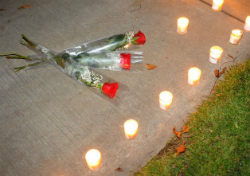You know that moment after you watch or listen to something deep…when you’re just left sitting there speechless…that just happened to me.

The host of one of my favorite radio podcasts,Tom Ashbrook of the NPR show OnPoint Radio, recently returned to his show after he took a two-month break following the loss of his late wife.
It’s one thing to go back to work after a personal tragedy. It’s another thing to have to talk to your coworkers about it. It’s an entirely different thing when your job involves talking to millions of people across the country…all of whom know what just happened in your life.
He handled his “first day back” with such honesty and grace…if for no other reason, everyone should listen to that show just to see an inspiring example of how to stand when everything around you has fallen.
January 2, 2015 – OnPoint Radio Show – “How We Grieve”
Tom devoted the show to an open and real discussion of loss, pain, grief, and finding your way forward. One of his guests was a rabbi from Massachusetts named Earl Grollman, who shared some of the lessons he learned over the course of years spent counseling grieving people.
The rabbi’s words (which I’ve quoted below) should be shared everywhere.
In the US, we have perfected the celebration of the win. I don’t think any other country does victory as well as we do…but we are terrible losers. I don’t mean loser in the typical sense…I mean loser in the sense of someone who has lost something – or someone – important.
Here is Rabbi Grollman’s advice:
Each person is different. Grief is as individual as snowflakes and fingerprints. So, when I deal with people, the first thing I do when I walk into the house is say four words: “There Are No Words.”
I don’t try to say I know how you feel…I don’t know how anybody feels. I don’t say “it’s God’s will”, because God hasn’t told me this. I don’t say “they’ve gone to a better place”, because the person may say, “their place is with me.”
So when I come to the person, when a death has taken place, the most important thing is to touch. They will remember not what you said, but how they felt afterwards.
Knowing how to deal with a loss is just as important as knowing how to celebrate a win. Here’s hoping we each spend more time learning how to handle our pain and the pain of those around us.
– Day G.
Host, Class of Hope & Change